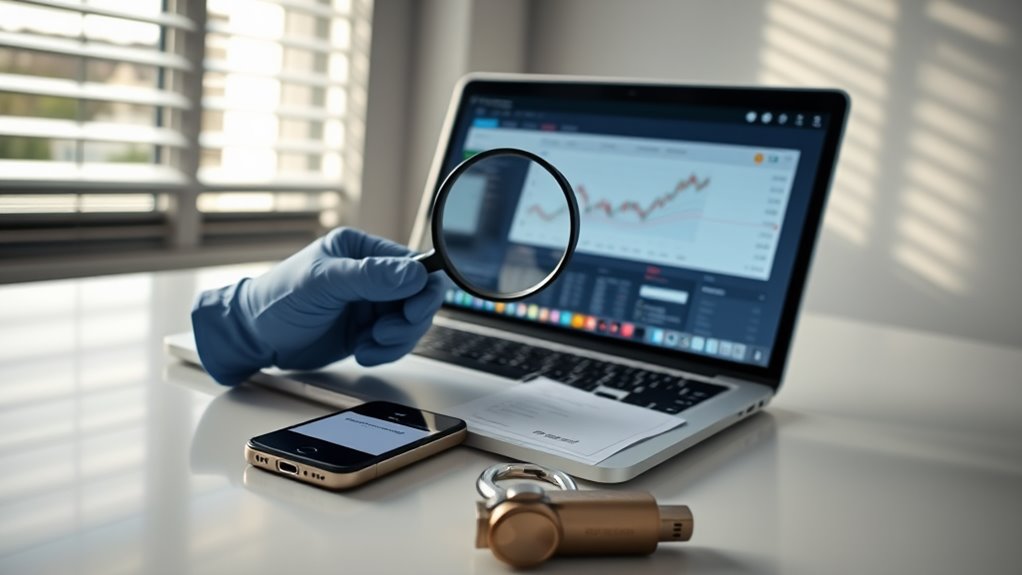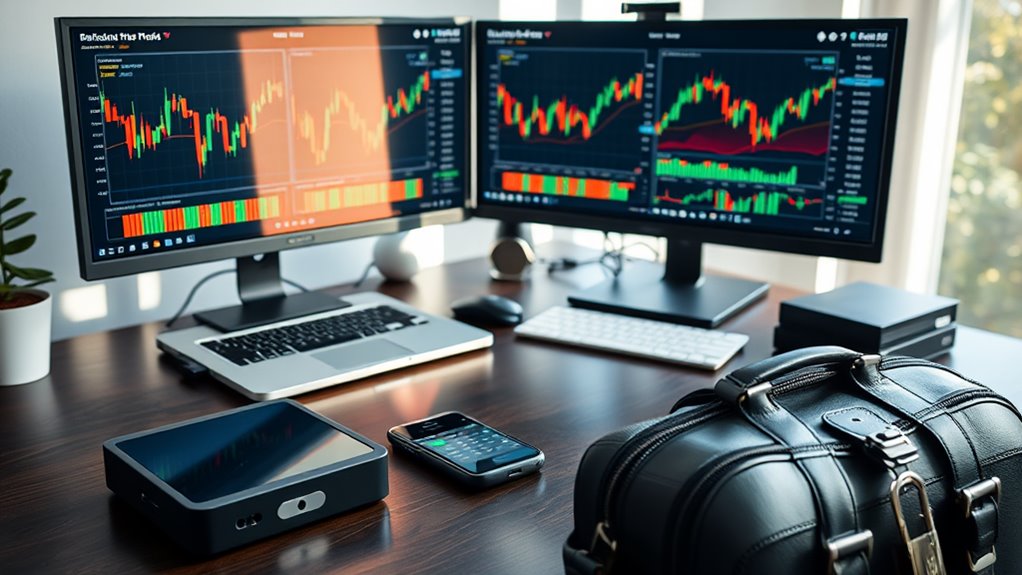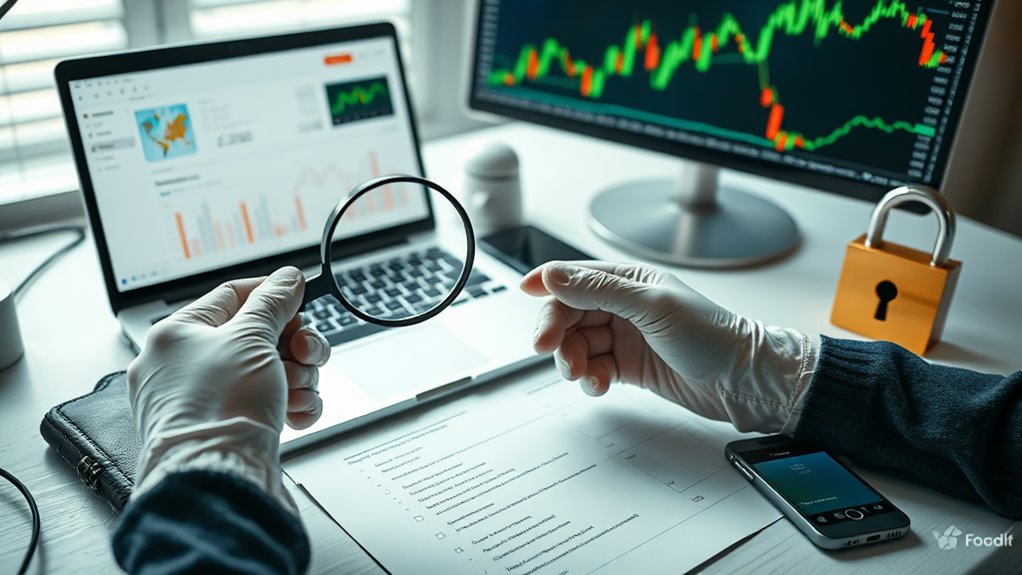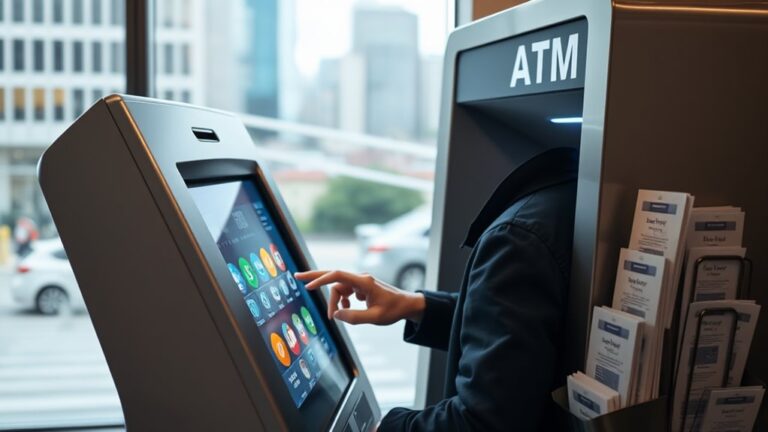
How to Avoid Scams When Buying & Selling Crypto: Essential Safety Tips
To avoid scams when buying and selling cryptocurrency, one must recognize common schemes like investment frauds and phishing, and implement safety practices such as using secure wallets and enabling two-factor authentication. Thorough research and verification of transactions are essential. Choosing well-audited, reputable platforms can further enhance security. Reporting any suspicious activity immediately helps in recovery and prevention of further loss. For extensive strategies to safeguard your investments, consider exploring more detailed guidance on this subject.
Key Takeaways
- Only trade on reputed exchanges that enforce strong security measures and regulatory compliance.
- Enable two-factor authentication and biometric scans for enhanced account protection.
- Verify all transaction details and recipient wallet addresses thoroughly before executing.
- Avoid platforms promising unrealistic returns and those pressurizing urgent investments.
- Regularly monitor your transaction history and report any suspicious activity immediately.
Understanding Common Crypto Scams and Their Red Flags

To safeguard against the increasing threat of cryptocurrency scams, it is essential to grasp the widespread nature of these deceptive tactics and recognize their warning signs.
Cryptocurrency investment scams frequently dupe investors with promises of high returns on seemingly legitimate platforms. Meanwhile, phishing attempts involve scammers mimicking trusted entities to steal wallet details through fake communications.
Protect your investment: beware of high-return promises and phishing scams posing as legitimate crypto platforms.
Pump and dump schemes artificially spike a cryptocurrency's value before the scammers cash out, drastically dropping the price. Additionally, some scams operate under the guise of cloud mining, offering nonexistent mining services for a fee.
Identifying such scams becomes clearer by noting promises of unrealistic returns, urgency pressures, lack of transparency, poor documentation, and unverified endorsements. Learning these red flags can protect potential investors from fraudulent schemes.
Effective regulations can provide a safer context for cryptocurrency dealings by reducing the appeal of fraudulent schemes through enhanced scrutiny and a more robust legal framework.
Implementing Essential Security Measures for Trading

A majority of cryptocurrency traders understand the vital importance of implementing essential security measures to safeguard their investments.
Adopting secure wallets, particularly hardware options, considerably minimizes risks, especially when combined with strong recovery phrases stored via password managers.
Security extends to authentication practices as well: enabling two-factor authentication (2FA) and using advanced methods like biometric scans enhance protection.
Network safety is also essential; traders should avoid public Wi-Fi, prefer encrypted VPN services, and keep their browsing environments secure.
Additionally, conducting regular security audits, updating software, and monitoring for unusual activities guarantee ongoing vigilance.
Practicing these security measures creates a robust defense against potential breaches, guaranteeing a safer trading environment.
For those storing substantial cryptocurrency amounts, considering cold storage options as a long-term security strategy further mitigates the risk of online threats and attacks.
Best Practices for Safe Cryptocurrency Transactions

Guaranteeing safe cryptocurrency transactions begins with thorough research before executing any trades. Individuals should verify recipient wallet addresses meticulously to prevent sending funds to incorrect accounts. Utilizing trusted exchanges minimizes risks associated with fraudulent activities. Regular monitoring of transaction activity is essential to detect and address signs of potential fraud at the earliest. Furthermore, documenting each transaction meticulously enhances both clarity and transparency, supporting the traceability of funds. It's vital to recognize and understand the risks inherent in cryptocurrency investments and to remain vigilant against common types of scams, such as unsolicited promises of unrealistic returns. Implementing two-factor authentication is crucial to enhancing the security of your crypto assets.
Guidelines for Choosing Secure Apps and Websites

After examining best practices for safe transactions in cryptocurrency, individuals must also focus on selecting secure apps and websites for their trading activities.
It's critical to employ a thorough approach in choosing platforms that bolster security and provide a reputable service.
- Ensure Cold Storage: Opt for services that utilize cold storage for the majority of funds to protect against potential hacking.
- Two-Factor Authentication: Always use platforms that offer two-factor authentication to enhance account security.
- Regular Security Audits: Prioritize platforms that conduct regular security audits, confirming their commitment to safeguarding user data.
- Reputation and Compliance: Select platforms recognized for complying with regulatory standards and possessing a solid reputation in handling user issues efficiently.
For those new to the space, considering options from a curated guide like the seven best cryptocurrency wallets can provide further insights into trustworthy and user-friendly platforms.
Steps for Reporting and Recovering From Crypto Scams

Recognizing and handling crypto scams efficiently can save both financial and emotional distress for individuals.
To effectively report a scam, it's essential to provide detailed information to the FBI's Internet Crime Complaint Center (IC3) at ic3.gov, including transaction details, communication records, and scammer identifiers like names and emails.
It's imperative not to alert the scammer about reporting them to the authorities.
Recovering from such scams involves swift actions like contacting banks to block dubious payments and notifying the cryptocurrency exchanges involved.
Immediately changing usernames and passwords can also prevent further damage.
Unfortunately, the recovery of stolen funds often requires legal intervention due to the challenging nature of reclaiming digital currencies.
Frequently Asked Questions
How Do I Safely Disclose Crypto Transactions for Tax Purposes?
To safely disclose crypto transactions for tax purposes, one should utilize IRS Form 1040, Schedule D, and Form 8949 to report capital gains and losses. It's advisable to keep detailed transaction records and calculate cost basis accurately.
Can Using a VPN Enhance My Crypto Trading Security?
Using a VPN can considerably enhance crypto trading security by encrypting internet traffic, masking IP addresses, and allowing access to geo-restricted exchanges, thereby protecting against hacking, surveillance, and common cyber threats.
What Are the Legal Implications of Buying Crypto Through Peer-To-Peer Networks?
Buying crypto through peer-to-peer networks can introduce legal complexities, including varied jurisdiction rules and potential non-compliance with AML and KYC regulations, risking penalties from regulatory bodies like FinCEN or encountering transaction disputes.
How Often Should I Update My Crypto Wallet for Security?
One should update their crypto wallet every time a new security patch is released, ideally within days. Regular updates protect against vulnerabilities and maintain wallet security against potential threats, enhancing overall system stability.
Are There Trusted Organizations That Certify the Security of Crypto Platforms?
Yes, organizations like ACAMS and the CryptoCurrency Certification Consortium (C4) provide certifications such as CCAS and CCSS to guarantee compliance and security standards are met by crypto platforms, enhancing trust and safety.
Conclusion
Steering through the world of cryptocurrency trading can be as challenging as walking through a maze blindfolded. By understanding common scams, implementing robust security measures, and adhering to best practices, traders can traverse this complex landscape more safely. It's vital to choose secure platforms and to know the steps for reporting scams. Remaining vigilant and informed are your best defenses against potential fraud, ensuring a safer trading experience in the rapidly evolving digital financial market.














